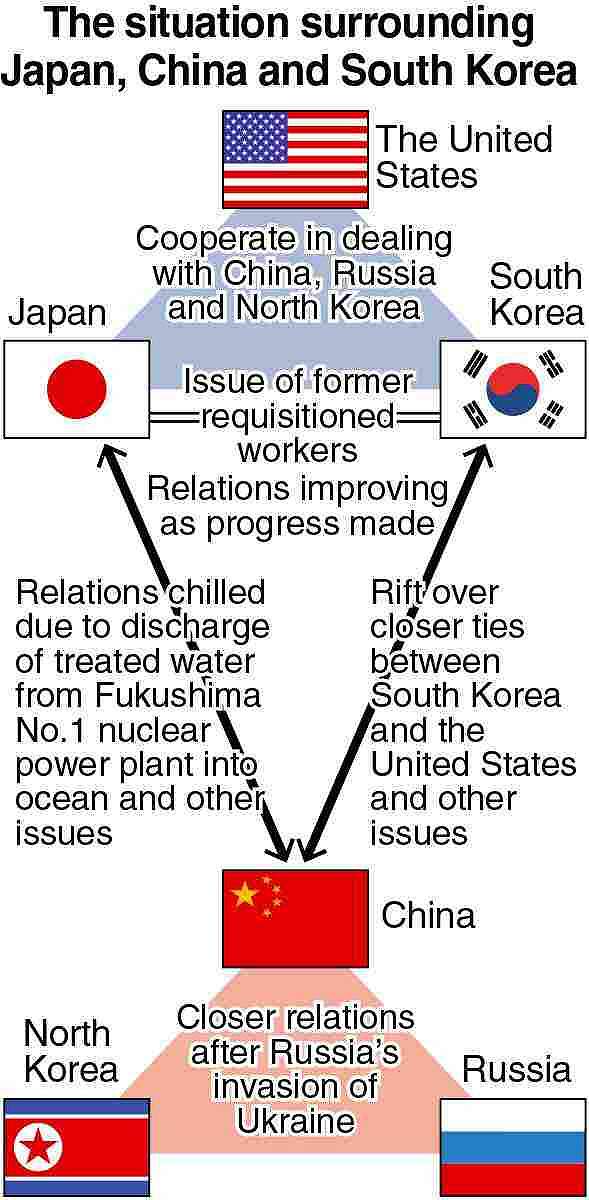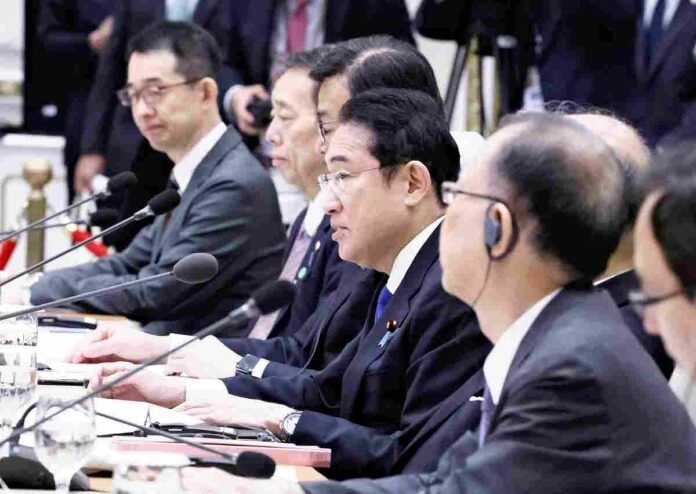Prime Minister Fumio Kishida (center) speaks at the trilateral summit between Japan, China and South Korea in Seoul on Monday.
20:00 JST, May 28, 2024
SEOUL – The recent trilateral summit between Japan, China and South Korea illustrated a clear confrontation with China, a country increasing its hegemonic behavior, with Japan and South Korea emphasizing the importance of maintaining international order under the rule of law. The biggest difference between the two blocs lay in their response to North Korea.
No mention of North Korea’s actions
The trilateral summit between Japan, China and South Korea, the first in about four and a half years, took place in Seoul on Monday morning, just after North Korea announced its plans to launch a satellite.
“If Pyongyang goes ahead with the launch, it will violate a UN Security Council resolution,” Prime Minister Fumio Kishida said sternly at the start of the three-way talks. South Korean President Yoon Suk Yeol also called on the international community to respond decisively. Chinese Premier Li Qiang, on the other hand, made no mention of North Korea’s announcement. From beginning to end, his statements seemed to warn against an anti-China alliance, including a call to oppose the emergence of alliances in the world.
At a joint press conference after the summit, the leaders of Japan and South Korea both referred to the importance of North Korea’s denuclearization. However, Li only said that all parties involved in the Korean Peninsula should maintain self-restraint to avoid further complicating the situation.
Night negotiations
The three countries were unable to agree on a joint statement during the denuclearization negotiations until the last minute.
The draft included wording that a fully denuclearized Korean Peninsula is the shared goal of every country. South Korea, which hosted the talks, cited the joint statement released after the 2019 trilateral meeting, which also mentioned “complete denuclearization,” when calling for this wording to be included. However, China strongly opposed South Korea’s proposal. Negotiations continued until early Monday morning. Just before the trilateral summit began, the three countries finally reached a compromise by emphasizing that each country had its own position on the issue.
China reportedly claimed that putting pressure on North Korea, for example by holding joint exercises between US and South Korean militaries and the Japanese Self-Defense Forces, is exacerbating tensions on the peninsula. A source close to the South Korean government who recalled the negotiations said it appeared four countries were taking part in the talks, including North Korea.
According to diplomatic sources in Beijing, China is also pursuing a denuclearized Korean Peninsula, which includes US troops in South Korea, while apparently avoiding working with Japan and South Korea so as not to irritate North Korea.
Words fell away because of opposition
The draft also originally stated that the three countries would oppose any attempt to unilaterally change the status quo through force or coercion anywhere in the world. However, these words were dropped after strong opposition from China, as Japan, the United States and South Korea often use the same words to criticize Chinese aggression in the East and South China Seas.

At a joint press conference, Kishida said he was talking about Russia’s invasion of Ukraine when he declared at the summit that any attempt to unilaterally change the status quo is unacceptable.
In the joint statement, the three countries confirmed that they would hold regular trilateral summits and ministerial meetings. The reason for the confirmation was that although they had agreed in 2008 to take turns hosting an annual trilateral summit, the meetings were often canceled due to the complicated relations between the three countries.
Japan is expected to host the next trilateral summit. “It is important to make a habit of holding talks between the three countries through a trilateral framework, no matter how bad relations become,” a senior foreign ministry official said.



